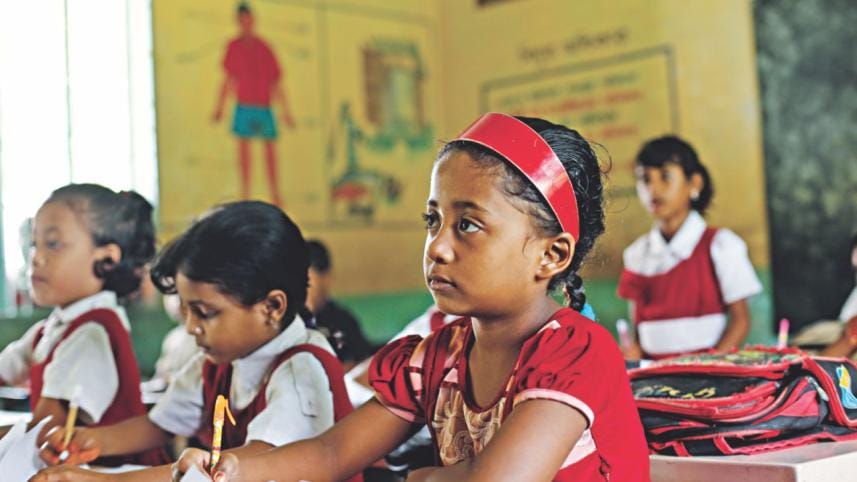Reinventing education

If you are still not alarmed by the grim predictions of our education system, let me apprise you of the current scenario.
It was revealed in a large-scale national survey commissioned by the Directorate of Primary Education that 1 in 4 students completing grade 5 are unable to read, write or do basic math at their grade level. Although the literacy rate has gone up considerably to 72.3 percent according to Unesco, the application of basic literacy tools is still inadequate. To make matters worse, the race for higher scores limits the purpose of education and schools to prepare students for exams, the kind of exams that may not have much relevance to the practical world. Guidebooks, private tutors and supplementary reading materials are added features that feed into a culture of regurgitation rather than innovation.
This naturally leads one to think about how the education system needs to be transformed to prepare students for the future. There are numerous studies on 21st-century education. It can be perplexing and strenuous to encapsulate it all in a single philosophy. However, the one factor that encompasses all the studies, findings, reports, analyses and gives it coherence is empathy.
Empathy is "seeing with the eyes of another, listening with the ears of another, and feeling with the heart of another." Making empathy a core element of the future education system will allow students to be in touch with their own emotions while also understanding the emotions of others. This will give them the ability to develop their humane, social, collaborative qualities to navigate through different relationships, interactions and community-building. In a globalised world, the ability to feel the emotions of another human being is crucial. By understanding the needs of others, one will be prompted to take action to meet those needs.
Problem-solving involves critical thinking and creativity. Empathy acts as a catalyst to develop and deploy the four important Cs of 21st-century skills, i.e. critical thinking and problem-solving, collaboration, creativity and communication.
According to Tony Wagner, the author of several books including Creating Innovators, "The exile of play is one of the greatest tragedies of standardisation." The culture of prioritising high test scores has resulted in diminished play time in the lives of students. Play allows them to build a world of imagination that is beyond the constraints of the real world. It allows children to think in diverse and creative ways that know no bounds. The more children play, the more they develop their sense of imagination and its articulation through storytelling. Play allows for the physical, cognitive and emotional development of children. When they make little tents or houses or play with pebbles or sticks, they learn to work and communicate in groups, advocate for themselves, negotiate and resolve conflicts. It improves their social skills and increases their confidence and resiliency.
In their 2010 report, researchers Paul Howard-Jones, Jayne Taylor, and Lesley Sutton explain how allowing students to first have time for play (10 minutes with a wad of playdough) before conducting a creative or standard task leads to better output and more creative ideas. When designing our education system for the future, we need to overemphasise play. The classrooms can be playgrounds and the lessons can be designed as games where passing each level requires students to unlock their potential. Students can play hopscotch to learn numbers, hangman to learn spelling, etc. Lessons can also be designed as simulations where in order to complete each grade students are challenged to solve puzzles depicting real-world scenarios such as global warming, economic recession, refugee crisis, etc. As Tony Wagner said, "Students spend their school hours bored, covering irrelevant material, doing mindless tasks, taking far too many standardised tests, and having the creativity and innovation schooled out of them. Our focus shouldn't be to give all kids equal access to the same bad education. We need to reinvent education and give all kids a fighting chance in life."
To keep up with this pace of change, it is essential to design an education system that allows learners to not only gain knowledge about the external world but also explore and hone their own talents and passions. We need to design a kind of education system that helps students identify their forte and work on it.
The current system leaves no room for soul-searching or self-exploration. Curriculum, classroom activities and school layout should all be designed to suit the learning preferences of the students. Teachers need to cater to the students as per their area of interest. After gaining a basic level of knowledge at elementary level, students should be allowed to explore different areas such as art, violin, piano, basketball, football, carpentry, graphics designing, mechanics, philosophy, literature, etc., to identify their passion. A student interested in carpentry should be then coached to become the best in the field. Instead of shepherding them, educators should give students the freedom to pursue their passion, which will naturally increase their curiosity and eagerness to learn.
Instead of fearing being overthrown by technology, we should think about ways in which we can leverage it to customise and present curricula, contents and assessments to develop the competencies of our students. Moreover, personalised learning is not an entirely new concept; it is a tried and tested method. It is high time we utilised it to create a generation of learners who can think for themselves and learn what they love, and to convert their passion into valuable currency for the future.
Azwa Nayeem is founder and chairperson of Alokito Hridoy Foundation, a non-profit organisation based in Bangladesh working in the field of education.




Comments